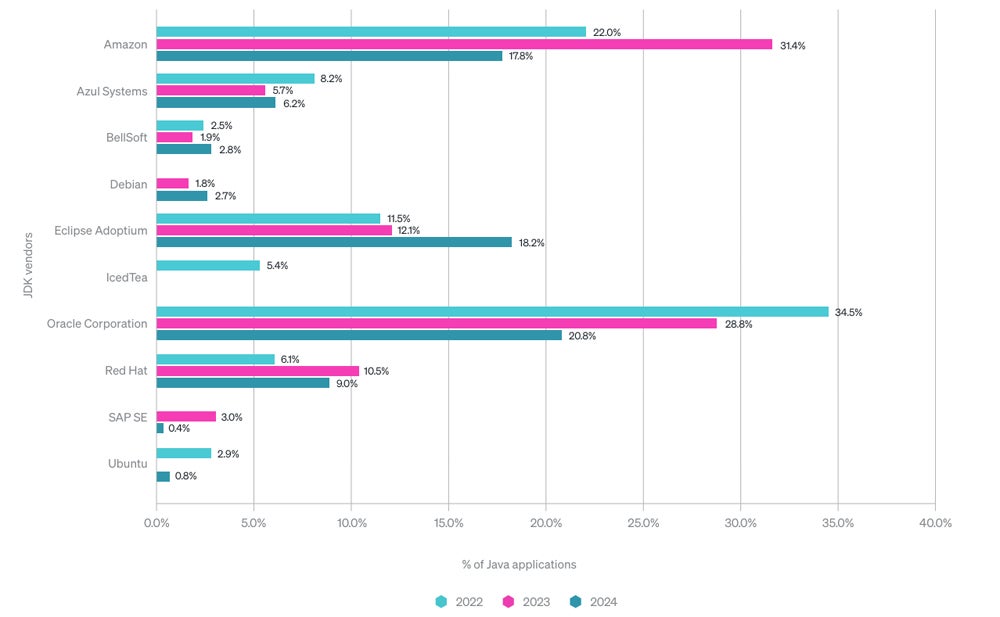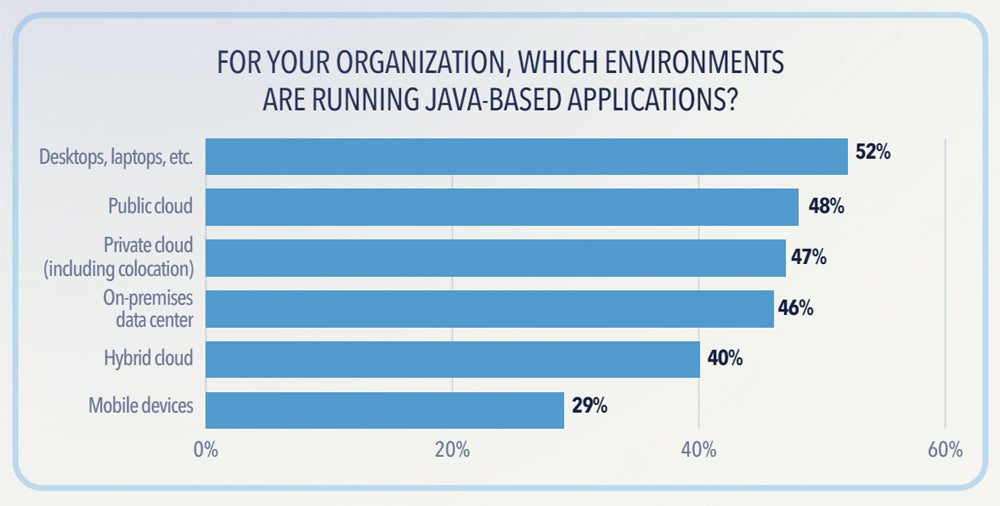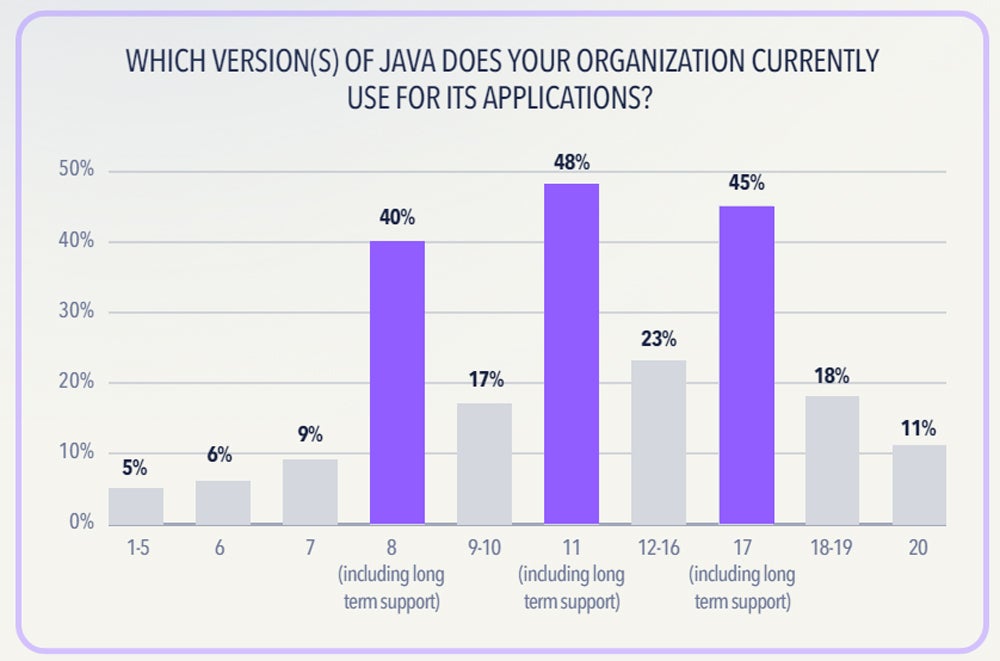Oracle’s Java Changes Lead APAC Enterprises to Explore Alternate suggestions Such As Azul
Java is one in all the sphere’s most in fashion programming languages. Platform-self reliant, easy to study, easy to make issue of and catch, the thing-oriented language ranks as one in all the sphere’s high four developer languages and has found its manner into project capabilities the sphere over.
On the opposite hand, since 2019, moves from Java Pattern Kit vendor Oracle to impose loads of license changes on new variations are causing organisations to eavesdrop on Java. Many companies in APAC are leaping ship in favour of OpenJDK suggestions bask in Azul Programs.
Gil Tene, chief skills officer at Azul, whose Java offering helps organisations bask in Netflix, Mastercard, Salesforce, Workday and Adobe, said its Java administration suggestions are additionally serving to possibilities optimise cloud costs and effectively de-chance Java vulnerabilities.
What changes like been made to Oracle’s Java licensing and pricing?
Oracle has made a series of changes to Oracle JDK licensing and pricing since 2019. These changes like been primarily aimed toward getting alternate customers of Oracle’s Java to pay one thing for the industrial issue of the beforehand free start-source vogue language.
Updates in 2019 and 2021
With the update in 2019, starting from Oracle JDK 8, Oracle sought to catch those using Oracle Java in industrial manufacturing to aquire an Oracle Java SE subscription. In 2021, a backlash precipitated it to reverse direction, and industrial manufacturing turned into once allowed from Oracle JDK 17.
The 2021 changes only included updates for Prolonged Term Pork up variations of Java for on the least one stout year after the unlock of the following LTS model, shorter than competing OpenJDK vendors. The brand new licence circumstances additionally did no longer allow redistribution for a payment.
The brand new 2023 update
In 2023, Oracle announced it would require organisations using Oracle Java to aquire a license for his or her entire employee inhabitants if even a single employee or server had build in a licensable model of Java.
Since the pricing alternate did no longer depend on the categorical sequence of Java customers and even captured the likes of contractors working for an organisation, the alternate entailed important increases in costs for companies selecting to continue with Oracle Java.
What are the outcomes of Oracle’s Java licensing and pricing changes?
With Oracle pursuing organisations using Oracle JDK, many are brooding about or are transferring to picks. Per New Relic’s 2024 Narrate of the Java Ecosystem fable, Oracle’s Java market portion slipped from 75% in 2020 to 21% in 2023, in conjunction with a 29% descend in portion in a single year.
SEE: Our book to navigating directories in Java bask in a talented
“There turned into once a noticeable movement away from Oracle binaries after the more restrictive licensing of its JDK 11 distribution (before the return to a more start stance with Java 17), and we’ve considered a customary decline year-over-year ever since then,” New Relic wrote.
Azul’s Narrate of Java Look for and Represent from 2023, which surveyed 2,000 companies using Java, found Oracle’s market portion dropped from 75% for Java Pattern Kit distributions in 2020 to 42% using on the very least one instance of Oracle Java in 2023.
In the fable, Azul found Oracle’s most contemporary 2023 licence and pricing update had sparked “approved apprehension.” It said 82% of companies expressed project over the alternate, and nearly three-fourths (72%) were actively exploring picks to Oracle Java.

Stepping in to catch Java customers turned into once Amazon, whose Coretto increased to 31% of the market in 2023, though this had dropped to 18% again by 2024. A differ of different vendors, such as community maintained Eclipse Adoptium and Azul Programs, like been taking pictures hobby too.
The quest for different JDK vendors in APAC suits Azul Programs
Azul’s APAC alternate is taking good thing relating to the shift away from Oracle JDK. The alternate affords both a trusted OracleJDK replace, which it calls Azul Platform Core, as properly as a top payment offering, Azul Platform Prime, designed for excessive performance, consistency and effectivity.
Azul Vice President APAC Dean Vaughan told TechRepublic that since Oracle’s most contemporary 2023 licensing alternate, the alternate has considered a surge in development in Australia, Malaysia, India, Taiwan and The Philippines. More no longer too lengthy in the past, it has additionally picked up Jap world multinationals.
Three advantages of taking a more in-depth sight at Java utilization
Java’s approved issue in enterprises is what has made Oracle’s licensing changes so relating for many. On the opposite hand, organisations pressured to sight carefully at how they’re using Java can additionally like the good thing about cloud impress optimisation, improved security and making their organisations more competitive of their alternate as properly as in the competitors for developer skills.
1. Charge optimisation of Java estates in the cloud
Azul’s Vaughan said organisations that like expanded in the cloud in APAC are seeing dramatic cloud impress increases via the utilization of hyperscalers bask in AWS or Azure or regional gamers bask in Tencent or Alibaba. Whereas some cloud companies work laborious to wait on possibilities rationalise workloads to diminish impress, he said they originate no longer spend time “ the stack.”
Azul is seeing development from cloud-native companies in markets bask in ASEAN, India and China. He said these nations like grown their very like predominantly native tech industries, and that, in comparability, to world companies, are fascinating to tell exterior the sphere by manner of OpenJDK vendors or optimising Java to “dramatically decrease” the cloud costs they’re incurring.

2. Facing vulnerabilities in older Java variations
Security, compliance and governance are one other key driver of paying more attention to Java. With the chance of fashioned vulnerabilities and exposures in older variations of Java and as a lot as the moment events bask in the Log4Shell vulnerability that impacted 80% of Java customers, organisations favor to contain distinct that they practise lovely hygiene by updating to more moderen variations of Java, per Azul.
One feature of Azul’s Intelligence Cloud offering, which sits on high of its Platform Core and Prime Java suggestions, is the skill to call and triage any vulnerabilities identified in Java variations. By setting up which identified vulnerabilities like basically been build into manufacturing, an organisation can contain distinct that DevOps teams spend time on the lovely things.

3. Give a enhance to competitiveness with newer or top payment Java variations
Many organisations favor to modernise by transferring to newer variations of Java. This may possibly well even like advantages bask in attracting youthful, talented developers and equipping vogue teams with the most modern Java traits. “Java has developed in sharp ways in the previous decade, so for some it’ll even be value investing in for the alternate,” Tene said.
Azul’s top payment model of Java called Java Prime has attracted a following in industries bask in financial companies and products in APAC. Tene said these companies are being attracted to an enhanced model of Java that is quicker, more fixed and may possibly well “take care of mammoth workloads.” This ensures they’re capable of preserve competitiveness with their peers of their market vertical.

